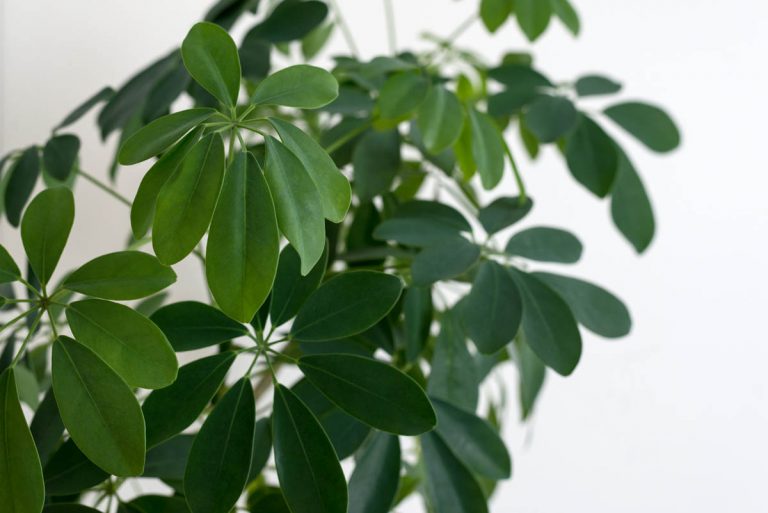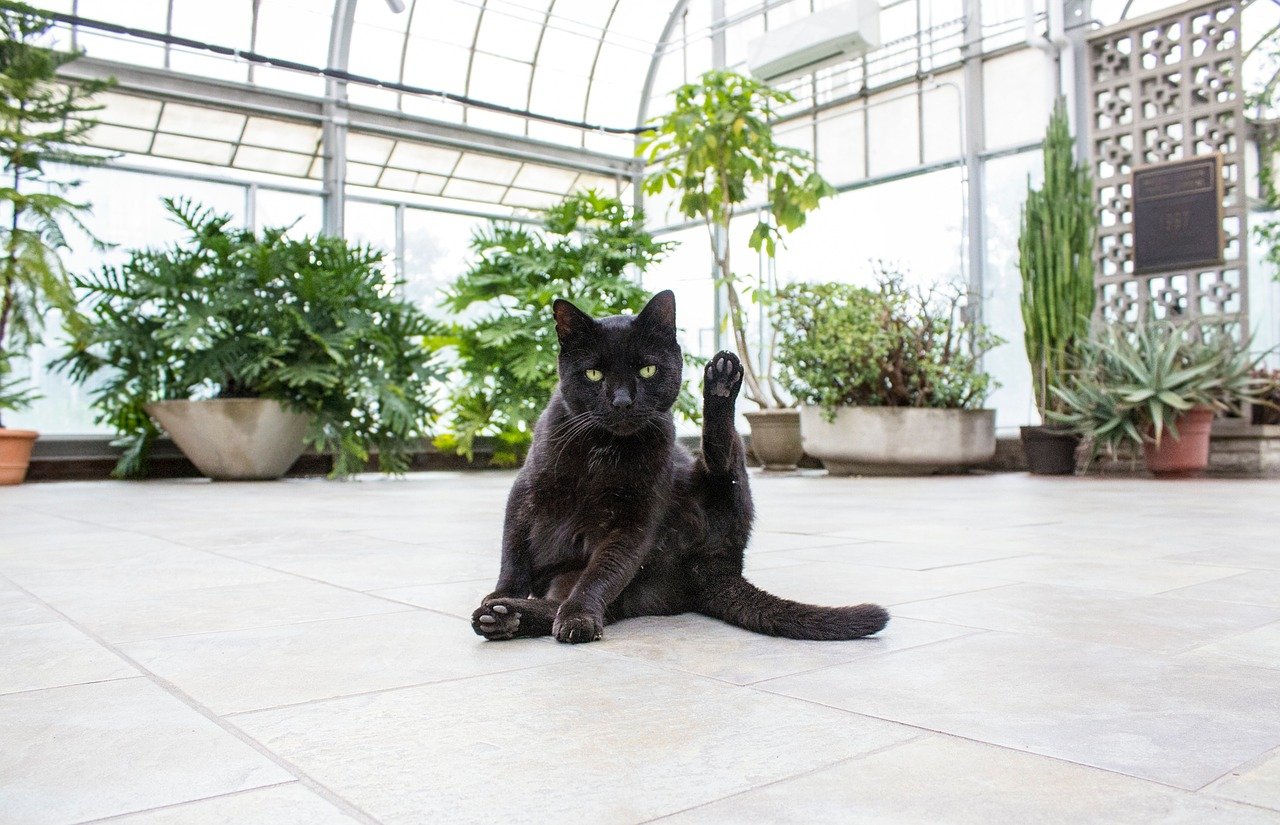A lot of people use plants to make their homes look nicer and add a bit of natural charm to the concrete jungle. However, many popular houseplants are toxic for our pets, and ingestion can be deadly. The term “umbrella plant” can refer to many different plant species, most of which are toxic for cats.
Umbrella trees, also known as schefflera, are popular houseplants. Their lush, green foliage and ease of care make them a staple in many homes. But cat owners should exercise caution – umbrella trees contain chemicals that are highly toxic to felines. Even a small nibble can cause severe poisoning.
In this article, we’ll cover why umbrella trees pose a danger to cats, typical symptoms of poisoning, and important safety tips for cat-friendly households. Being informed is key to keeping your curious kitty safe and healthy.
Understanding the Umbrella Tree’s Toxicity to Cats
All parts of the umbrella tree, including the leaves, stems, and roots, contain irritating chemicals that are toxic to cats if ingested. The main culprits are:
-
Oxalate crystals – Sharp insoluble crystals that penetrate tissue and cause pain and inflammation.
-
Saponins – Soapy compounds that damage red blood cells and irritate mucous membranes,
-
Terpenoids – General cellular irritants produced by plants as a defense against being eaten.
Even small amounts of umbrella tree matter can expose cats to these toxins with severe consequences. The effects worsen if a cat consumes substantial portions of the plant.
Recognizing Signs of Umbrella Tree Poisoning
If your cat ingests any part of an umbrella tree. watch for these common symptoms of poisoning
- Excessive drooling and pawing at the mouth
- Vomiting and diarrhea
- Swelling and redness of the lips, tongue, and throat
- Difficulty breathing
- Loss of appetite
- Lethargy or depression
- Dilated pupils
Any changes after your cat interacts with an umbrella tree, especially involving the face or mouth, warrant an immediate vet visit. Timely treatment is critical.
Diagnosing and Treating Umbrella Tree Poisoning
To diagnose umbrella tree poisoning, the vet will:
- Perform a physical exam to check symptoms, vital signs, and reactions
- Take a medical history and inquire about exposure to the plant
- Run lab tests on blood and stomach contents to identify toxins
Initial treatment focuses on:
-
Stabilizing the cat with IV fluids and medication
-
Inducing vomiting to eliminate stomach contents
-
Feeding yogurt to coat the digestive tract and mitigate irritation
-
Monitoring for at least 24 hours to ensure other symptoms don’t arise
Ongoing treatment at home may include rest, a bland diet, and rehydration therapy to allow the cat to fully recover.
Protecting Your Cat from Umbrella Trees
Here are some key tips to keep your cat safe if you have an umbrella tree at home:
-
Place it somewhere inaccessible to pets, like on a high shelf or windowsill
-
Consider using an indoor pet-proof fence to block access
-
Opt for artificial umbrella trees if you can’t prevent real plant access
-
Keep the plant in a room your cat is not allowed to access at all
-
Train your cat to avoid the plant with deterrents like tin foil or citrus scents
-
Remove nibbled leaves immediately before cat can ingest further
-
Redirect chewing behavior to approved plants like cat grass
Your vet may have additional suggestions tailored to your unique situation. When in doubt, play it safe by removing or restricting umbrella tree access. Your cat’s health is too precious to risk.
Outlook for Cats After Umbrella Tree Poisoning
With prompt veterinary treatment, most cats make a full recovery after umbrella tree poisoning. However, without swift care, severe intoxication can lead to potentially fatal outcomes.
Long-term prognosis also depends on the amount consumed and whether the cat suffered secondary issues like liver damage or respiratory distress. Follow all at-home care instructions to help your cat bounce back after this scary ordeal.
Above all, prevent future umbrella tree exposure by containing or eliminating these plants from your home altogether. While beautiful, they simply aren’t worth endangering your precious feline companion. With extra caution, you can maintain a safe, cat-friendly indoor environment.
Umbrella Plant Toxicity: Are They Toxic to Cats?
The ASPCA has a list of plants that are toxic and plants that are not toxic. The umbrella plant, Eriogonum umbellatum, is not toxic for cats, dogs, or horses. However, even if the plant is not naturally toxic cats may still experience gastrointestinal distress.
Cats are what we refer to as “obligate carnivores” in the science world. That means they’re biologically predestined to consume a diet primarily made up of animal proteins. In the wild, a least 70% of a cat’s diet comprises animal proteins.
Their gut microbiomes are different from those of herbivorous and omnivorous animals. Herbivorous and omnivorous animals have a caecum that breaks down plant matter with bacteria. This part of the digestive tract is smaller and doesn’t have the digestive enzymes and bacteria that break down plant matter.
So, when a cat eats plant matter, even if the plant isn’t naturally bad for them, they may still have stomach problems because of how their bodies are built.
Plants That Are Toxic to Cats!!
Are umbrella plants toxic to cats?
Umbrella plants are toxic for cats, but in most cases, symptoms are only mild. By following these simple tips, you can help to keep your cat safe from toxic plants such as the umbrella plant and keep your plants safe from curious cats.
Can cats eat umbrella plants?
Even though umbrella plants are generally only mildly toxic to cats, there is still a chance your cat might experience symptoms of toxic levels of saponins depending on how much of the plant was eaten. Additionally, although uncommon, your cat can also become sick from fertilizers and pesticides that many commercial growers use on their plants.
Are household plants safe for cats?
Household plants can add a splash of color to your home décor and make your living area feel more alive. Not all plants are safe for pets, and it’s vital to remove toxic varieties, especially when your cat loves chewing on leaves. Common household plants, like Schefflera, are toxic to both cats and dogs.
How do I know if my cat has umbrella tree poisoning?
In order to diagnose umbrella tree poisoning, the vet will first have to perform a physical examination of the animal. This will allow them to gauge the symptoms for themselves, and test the cat’s vital signs and reactions.
- The Ultimate Guide to Growing Strawberries in Raised Beds - August 8, 2025
- No-Dig Garden Beds: The Easiest Way to Grow a Beautiful Garden - August 6, 2025
- How to Protect and Preserve Wood for Raised Garden Beds - August 6, 2025


